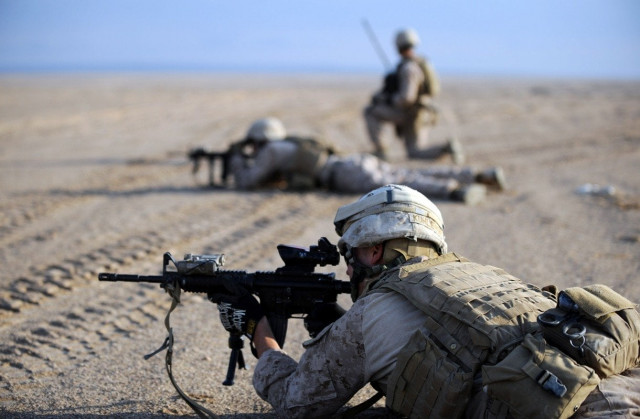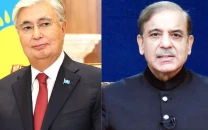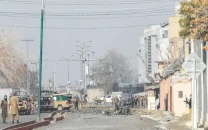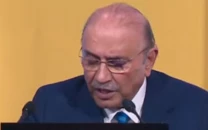Will the US leave us high and dry?
Pakistan insists Obama administration must not repeat history and turn a blind eye towards Afghanistan after pullout

A file photo of US troops in Afghanistan. PHOTO: AFP
The United States and its allies have finally wrapped up their long, deadly and costly mission in Afghanistan. While a debate is ongoing on how successful this mission was, the withdrawal of the US-led foreign forces will have far-reaching implications for Pakistan.
Over the past few decades, Pakistan’s foreign policy has been considerably shaped by events in Afghanistan. Afghanistan is a country which has remained the driving force for ups and downs in Pak-US relationship.
Prior to the 9/11 attacks, Pakistan was under US economic sanctions due to its nuclear programme and was further isolated globally when the then army chief, General Pervez Musharraf, toppled the civilian government in 1999.

Under the bilateral security agreement signed between Washington and Kabul, US forces still have access to military facilities at Kabul, Bagram, Mazar-i-Sharif, Herat, Khandahar, Helmand, Gardez, Jalalabad and Shindand
But the 9/11 attacks changed everything. Musharraf’s decision to join hands with the Bush administration to overthrow the Taliban regime in Afghanistan was a turning point in Islamabad’s ties with Washington. It was a paradigm shift in Pakistan’s decade-long policy of supporting the Taliban in Kabul, although the West is still sceptical that Islamabad may not have completely cut off its ties with the insurgents.
As a result of policy shift, Pakistan’s international isolation ended. And many Western leaders started travelling to Pakistan and holding talks with Musharraf. Pakistan was even declared a major non-Nato ally and was seen as a frontline state in the ‘war against terrorism’.
Since 9/11, Islamabad benefited from increased global attention and better access to resources. Pakistan has received around $21 billion in economic and military assistance from the US. But a large chunk of this money, around $13 billion, came under the Coalition Support Fund to reimburse the military cost Pakistan incurred in the fight against terrorism while about $8 billion in civilian assistance, $5 billion of which were delivered over the last five years under the Kerry-Lugar-Berman Act.
Despite major hiccups including Raymond Davis controversy, Bin Laden secret raid, Salala attack and accusations of the US against Pakistani security establishment for its alleged double play, the US fight against Taliban in Afghanistan means breakup with Pakistan was not an option.

Source: Icasualties.org
But the situation will certainly change after the US pullout. The major challenge for both Pakistan and the US is to sustain what is seen as crucial cooperation in post-2014.
Pakistani authorities have repeatedly voiced concerns over the US once again turning a blind eye towards the war-raged country in the wake of end of the combat operation. The US, however, has assured that it will not repeat the mistake of 1979 when it left the region high and dry.
While the US may not completely detach itself from the region due to important strategic concerns, political experts are of the view that Pakistan should not expect continued military and economic assistance beyond 2015.
Published in The Express Tribune, January 6th, 2015.



















COMMENTS
Comments are moderated and generally will be posted if they are on-topic and not abusive.
For more information, please see our Comments FAQ